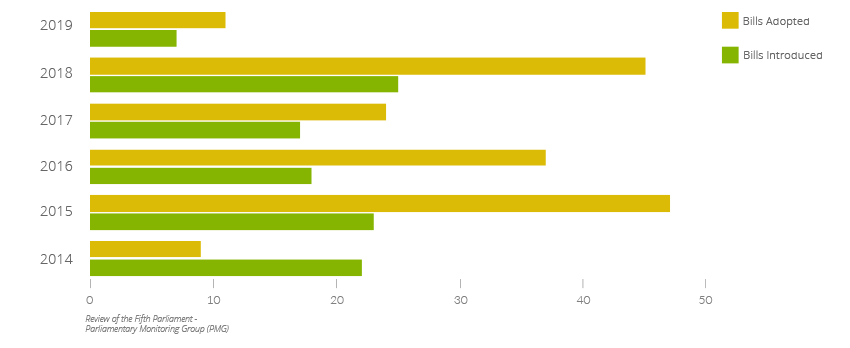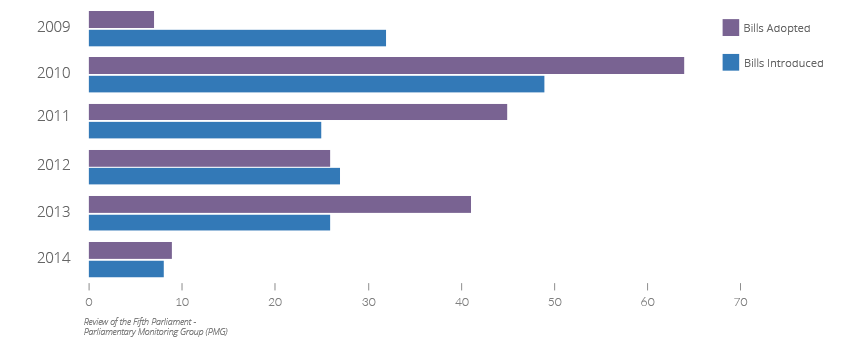Legislative Performance: Fifth Parliament
FIFTH PARLIAMENT: COMPLETE BILLS ACTIVITY
| BILLS INTRODUCED | BILLS PASSED | COMMITTEE BILLS | PRIVATE MEMBERS’ BILLS | EXECUTIVE BILLS | REJECTED/WITHDRAWN/LAPSED | |
| 2014 post election | 11 | 7 | 0 | 0 | 11 | 0 |
| 2015 | 45 | 25 | 1 | 5 | 39 | 2 |
| 2016 | 24 | 17 | 1 | 1 | 22 | 3 |
| 2017 | 37 | 18 | 1 | 4 | 32 | 4 |
| 2018 | 47 | 23 | 5 | 11 | 31 | 6 |
| 2019 | 9 | 22 | 11 | 1 | 7 | 6 |
| TOTAL | 173 | 112 | 9 | 22 | 142 | 21 |
FOURTH PARLIAMENT: COMPLETE BILLS ACTIVITY
| BILLS INTRODUCED | BILLS PASSED | COMMITTEE BILLS | PRIVATE MEMBERS’ BILLS | EXECUTIVE BILLS | REJECTED/WITHDRAWN/LAPSED | |
| 2014 pre-election | 7 | 32 | 2 | 0 | 5 | 1 |
| 2013 | 64 | 49 | 3 | 8 | 53 | 12 |
| 2012 | 45 | 25 | 4 | 1 | 40 | 6 |
| 2011 | 26 | 27 | 0 | 0 | 26 | 5 |
| 2010 | 41 | 26 | 1 | 0 | 40 | 0 |
| 2009 post election | 9 | 8 | 1 | 0 | 8 | 1 |
| TOTAL | 192 | 167 | 11 | 9 | 172 | 25 |
Looking at the above figures in more detail, one is able to calculate the adoption or efficiency percentage of the Fifth Parliament: this means the percentage of introduced Bills which were successfully adopted by Parliament – to calculate this percentage we divide the total number of Bills adopted in the Fifth Parliament by the total number of Bills introduced in the Fifth Parliament. The calculation finds the efficiency percentage of the Fifth Parliament to be 65%
This is in contrast to the Fourth Parliament which had an efficiency percentage of 87%
In the Fifth Parliament, the national legislature passed 112 Bills (view addendum) and considered dozens more. It is significant that a third of all Bills passed by the Fifth Parliament were passed in the final six months of the five-year term.
Of the Bills tabled in the Fifth Parliament, 82% were introduced by the Executive. 5% of the Bills introduced were Committee Bills and the remaining 13% were introduced by individual Members of Parliament (Private Members’ Bills - view addendum) that is, of 173 Bills introduced in the Fifth Parliament, 9 Bills were initiated by Committees and 22 by Private Members.
By the time both Houses concluded their business, there were 39 Bills leftover – practice dictates that the Sixth Parliament can revive any of these Bills at any stage of its proceedings. Technically, all 39 Bills lapse, as all other parliamentary business does, as at the date of dissolution of the Fifth Parliament, i.e. midnight of 7 May 2019. At the time of writing, there were 26 Bills (view addendum) passed by the Fifth Parliament awaiting presidential assent.
FIFTH PARLIAMENT LEGISLATIVE PERFORMANCE

FOURTH PARLIAMENT LEGISLATIVE PERFORMANCE

FIFTH PARLIAMENT COMMITTEE BILLS
| YEAR INTRODUCED | TITLE AND NUMBER | COMMITTEE | STATUS |
| 2015 | Refugees Amendment Bill [B19-2015] | Portfolio Committee on Home Affairs | Act commenced |
| 2016 | Immigration Amendment Bill [B5-2016] | Portfolio Committee on Home Affairs | Signed into law |
| 2016 | Political Party Funding Bill [B33-2017] | Ad Hoc Committee on the Funding of Political Parties | Signed into law |
| 2018 | Public Audit Amendment Bill [B13-2018] | Standing Committee on the Auditor-General | Signed into law |
| 2018 | Powers, Privileges and Immunities of Parliament and Provincial Legislatures Amendment Bill [B18-2018] | Ad Hoc Committee on Powers and Privileges of Parliament | Waiting assent |
| 2018 | Independent Police Investigative Directorate Amendment Bill [B25-2018] | Portfolio Committee on Police | Under consideration of NCOP |
| 2018 | Money Bills Amendment Procedure and Related Matters Amendment Bill [B28-2018] | Standing Committee on Finance | Signed into law |
| 2018 | National Credit Amendment Bill | Portfolio Committee on Trade and Industry | Waiting assent |
| 2018 | Public Investment Corporation Bill | Standing Committee on Finance | Waiting assent |
The numbers are a slight improvement from the Fourth Parliament where of the 192 Bills introduced, 7 were Committee Bills and 9 were Private Members’ Bills. 89% of Bills introduced in the Fourth Parliament were introduced by the Executive.
In the Fifth Parliament, the Minister of Finance introduced the most number of Bills: 53 from post election 2014 to 2019.
This is followed by the Minister of Justice and Correctional Services which introduced 21 Bills in the Fifth Parliament. The number of Bills introduced by a single Minister then decreases dramatically with the Minister of Agriculture, Forestry and Fisheries introducing 6 Bills. Based on our calculations, an average of 4 Bills were introduced per Department over the Fifth Parliament. There are however some Departments which have not introduced any legislation over the Fifth Parliament –Arts & Culture, Basic Education, Energy, Tourism and Water & Sanitation
Turning to the legislative workload of Committees over the Fifth Parliament, the above numbers are reflected in the workload where the Standing Committee on Finance considered 35 Bills in 136 meetings and the Standing Committee on Appropriations considered 26 Bills in 89 meetings – this is followed by the Portfolio Committee on Justice and Correctional Services considering 20 Bills over 85 meetings. A special mention must be given to the Portfolio Committee on Trade and Industry which considered 6 Bills over 108 meetings – this gives credence to a point made by PMG in its legislative performance of Parliament study which observed that passing legislation in too short a time does not necessarily lead to efficiency as emphasis is placed on the quality of legislation passed.
The figure below outlines the spread of Bill types introduced in the Fifth Parliament:
- Section 75: Bills not affecting the province
- Section 76: Bills affecting the province
- Section 77: Money Bills
Interestingly, no Section 74 Bills (constitutional amendments) were introduced in the Fifth Parliament
Share this page:
Review of the 5th Parliament
Articles
- How does the PR system affect the quality of input in Parliament?
- Observing Parliament: my reflections
- A Constitutional Fiction: Parliamentary Oversight of the Executive
- Some thoughts on the Fifth Parliament
- Do small parties work for Parliament?
- View from the opposition benches
- Improving Parliament's ineffective oversight
- Parliamentary Advocacy: How to have an influence?
- Public Engagement: A Case Study
- Notes from the House
- Committee System: performance and areas of reform
- A step forward
- Why has Parliament not yet amended the Budget?
- Points of order (by an observer)
- Diary of a Parliamentary Nerd

